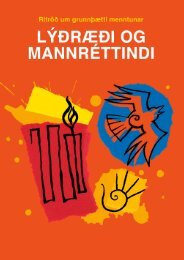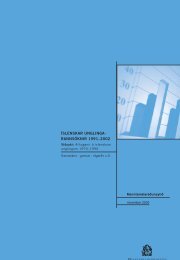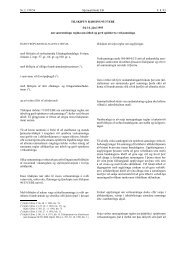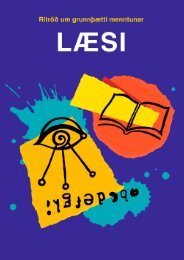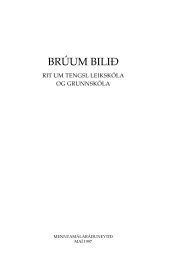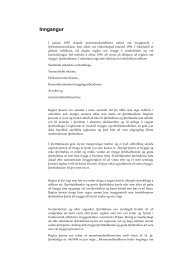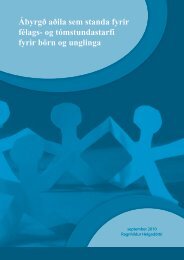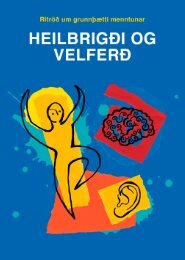Arts and Cultural Education in Iceland : Professor Anne Bamford
Arts and Cultural Education in Iceland : Professor Anne Bamford
Arts and Cultural Education in Iceland : Professor Anne Bamford
You also want an ePaper? Increase the reach of your titles
YUMPU automatically turns print PDFs into web optimized ePapers that Google loves.
This vignette from an academic <strong>in</strong> the university gives <strong>in</strong>sight <strong>in</strong>to the concerns from the<br />
suppliers of professional development:<br />
Vignette 3.9.1 We used to have a system for offer<strong>in</strong>g <strong>in</strong>-service education<br />
We used to have a system for offer<strong>in</strong>g <strong>in</strong>-service education. But now schools can choose for themselves. In 1996 the<br />
municipalities took over the responsibility of <strong>in</strong>-service education. I th<strong>in</strong>k s<strong>in</strong>ce then the offer<strong>in</strong>gs <strong>in</strong> the arts have been<br />
gradually gett<strong>in</strong>g worse. There are very few opportunities <strong>in</strong> the arts <strong>and</strong> only a few teachers from a school can go. I<br />
th<strong>in</strong>k everyone is unhappy. I th<strong>in</strong>k sometimes even the pr<strong>in</strong>cipal chooses the courses. They have to f<strong>in</strong>d someth<strong>in</strong>g<br />
that is relevant. The offers have decreased drastically. We offer courses through the university but these now have to<br />
be fully economically costed <strong>and</strong> that makes them expensive. We have tried offer<strong>in</strong>g courses such as “Music <strong>and</strong><br />
movement for the whole school” but there was very little response. It ended up not runn<strong>in</strong>g because there were so<br />
few attendees. The unions <strong>and</strong> civil authorities also offer courses, but overall I th<strong>in</strong>k it is quite disjo<strong>in</strong>ted.<br />
I th<strong>in</strong>k we need to reth<strong>in</strong>k the whole approach to recurrent education for teachers. If we th<strong>in</strong>k about it another way, a<br />
pre-primary school asked for a course about visual arts <strong>and</strong> then too many people came. We offer teachers the<br />
opportunity to do a one year course, like a sabbatical year. But they have to come here to study. Each year about 20-<br />
30 teachers take up that offer. Teacher education needs to be planned as a lifelong project. There is <strong>in</strong>terest for<br />
courses related to the arts <strong>and</strong> technology, like how to use ‘Garage B<strong>and</strong>’. But these are ma<strong>in</strong>ly offered by the labour<br />
unions <strong>and</strong> I th<strong>in</strong>k that money becomes the motivation. We have had a 10% cut back <strong>in</strong> our funds so I guess mak<strong>in</strong>g<br />
money will be even more vital. We worry a lot as the university says courses with less than 15 people will be cut <strong>and</strong><br />
many of the arts courses have less than 10 people. Numbers generally <strong>in</strong> teacher education are decl<strong>in</strong><strong>in</strong>g. It will be a<br />
difficult few years.<br />
The notion of practice-based degrees – <strong>and</strong> professional learn<strong>in</strong>g pathways – for people <strong>in</strong><br />
education, the arts or creative <strong>in</strong>dustries is only just emerg<strong>in</strong>g. Most postgraduate programmes<br />
are full-time, or are conducted dur<strong>in</strong>g school time <strong>and</strong> so therefore are not accessible for<br />
teachers who are teach<strong>in</strong>g full-time. It has also been considered that ‘distance learn<strong>in</strong>g’ does not<br />
provide an acceptable model for further education <strong>in</strong> the arts because of the <strong>in</strong>herently practical<br />
nature of arts education.<br />
While the vignette (3.9.1) was critical of the move to more local control of professional<br />
education, other respondents spoke highly of the quality of some of the offers made at the local<br />
level, as the follow<strong>in</strong>g example shows:<br />
A lady came <strong>in</strong> to give a course. The City Office organised the course. The City Office is very good. Each<br />
municipality provides offers. She came from the Centre for Research <strong>in</strong> Early Childhood. The courses offered by<br />
the City Office are free. She talked about the Penn green approach to early year’s education <strong>in</strong> Engl<strong>and</strong> <strong>and</strong> I feel<br />
<strong>in</strong> love with that approach. The course was a collaboration of 80 city schools. S<strong>in</strong>ce go<strong>in</strong>g to that course we have<br />
become fired up. The teachers learnt that they can do art from noth<strong>in</strong>g. Every day we are try<strong>in</strong>g to put more art<br />
<strong>in</strong>. Instead of the teachers mak<strong>in</strong>g th<strong>in</strong>gs, we learnt that children need to take ownership <strong>and</strong> do it themselves. It<br />
is a method that works <strong>and</strong> is for everyone. I have been a classroom teacher for 45 years, but you can still learn<br />
someth<strong>in</strong>g new. I learnt that you can hang everyth<strong>in</strong>g around a little seed of an idea. We made maps of high <strong>and</strong><br />
low places <strong>and</strong> that then lead to mak<strong>in</strong>g models. Everyth<strong>in</strong>g came from the children. Everyth<strong>in</strong>g we needed was<br />
at h<strong>and</strong>. Children learn th<strong>in</strong>gs by th<strong>in</strong>k<strong>in</strong>g about it <strong>and</strong> by do<strong>in</strong>g it themselves. You need to share someth<strong>in</strong>g of<br />
yourself.<br />
With<strong>in</strong> the music schools, special provisions exist for cont<strong>in</strong>ued professional education. In<br />
2001 there was a wage agreement that <strong>in</strong>cluded a 0.5% addition to cover professional<br />
development of teachers <strong>in</strong> the music school. There is also music teacher association money that<br />
can be applied for, as the follow<strong>in</strong>g example shows: “We try as a whole staff group to go abroad<br />
every third year. For example we all went abroad to do a course on us<strong>in</strong>g Sibelius software. We<br />
have also been to concert series <strong>in</strong> Berl<strong>in</strong> <strong>and</strong> Italy. The next staff day we are do<strong>in</strong>g a topic on<br />
work<strong>in</strong>g with music <strong>and</strong> people with disabilities. The local authorities really only offer general<br />
courses like health <strong>and</strong> safety <strong>and</strong> these are less relevant so it is really on us to be proactive <strong>and</strong><br />
build someth<strong>in</strong>g relevant.” The Association of Music School Teachers has a fund that offers each<br />
teacher support for professional development cost of up to 200.000 ISK every three years. In<br />
addition, the support for a group educational trip is 60.000 ISK per teacher every 3rd year.<br />
85



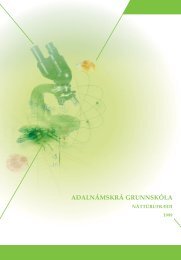
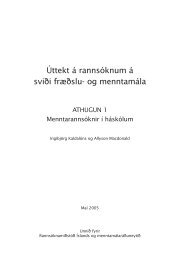
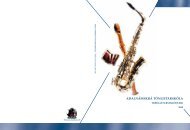
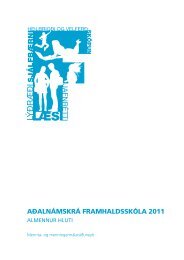
![Aðalnámskrá tónlistarskóla : rytmÃsk tónlist [Eingöngu á rafrænu formi]](https://img.yumpu.com/50843672/1/184x260/aaalnamskra-tanlistarskala-rytma-sk-tanlist-eingangu-a-rafranu-formi.jpg?quality=85)
